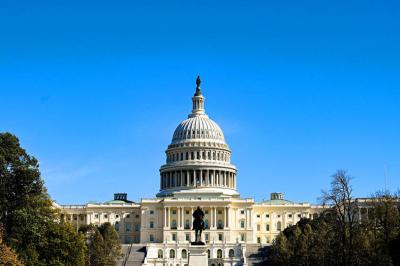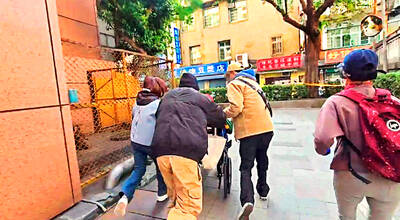The Ministry of Economic Affairs (MOEA) dismissed speculation that Taiwan’s admission into the US’ visa-waiver program would be linked to concessions on easing restrictions on imports of US beef.
“They are two different issues, and there is no question of one being traded for the other,” a ranking economics official said.
The official said that the US holds the same view, and asked people not to link the two issues.
The official was responding to media reports on Friday saying the US was hinting that without progress on the beef issue, Taiwan would not be given visa-waiver status.
The US has pressed Taiwan to lift its ban on beef containing ractopamine, a lean meat-enhancing drug that had been found in some shipments of beef from the US that were subsequently denied entry into Taiwan.
Taiwan bans the use of the drug, although the US and some other countries such as Australia, Canada and New Zealand accept certain amounts of residue of the drug in beef.
The Council of Agriculture (COA) said domestic opinion on whether to set a standard for a permissible level of the drug is divided.
“We have to see the decision of a Codex Alimentarius Commission [CAC] meeting in July,” the official said.
The official said that among commission members, the EU and China are opposed to the setting of an international standard that would allow ractopamine residue in beef.
“There is a possibility that a consensus could be reached at July’s meeting, but it will be quite difficult,” the official said.
Taiwan, as a WTO member, signed an agreement to accept food safety standards set by the CAC, which did not set an allowable level for ractopamine residue last year, the official said.
If the commission stipulates an acceptable maximum level of ractopamine, then Taiwan will have to accept it, the COA official said.
The dispute over beef has caused a suspension of trade talks between Taiwan and the US under the Trade and Investment Framework Agreement (TIFA).
The TIFA, signed in September 1994, provides an official framework for Taiwan-US dialogue on trade and economic issues in the absence of diplomatic ties.
Taiwan and the US have not held any TIFA talks since 2007, mainly because of controversy over beef imports from the US because of reported cases there of bovine spongiform encephalopathy, or mad cow disease.
The talks, originally scheduled to resume early last year, were further delayed after Taiwan found ractopamine in beef products early that year and blocked their entry.
Meanwhile, an official with the Department of Health said on Friday that he was not aware of reports of a trade-off.
Food and Drug Administration Director General Kang Jaw-jou (康照洲) said the COA is in charge of animal drugs.
“If it decides itself or through coordination with other agencies to decide to lift the ban, the Food and Drug Administration will follow through on the decision,” Kang said.

Taiwan must first strengthen its own national defense to deter a potential invasion by China as cross-strait tensions continue to rise, multiple European lawmakers said on Friday. In a media interview in Taipei marking the conclusion of an eight-member European parliamentary delegation’s six-day visit to Taiwan, the lawmakers urged Taipei to remain vigilant and increase defense spending. “All those who claim they want to protect you actually want to conquer you,” Ukrainian lawmaker Serhii Soboliev said when asked what lessons Taiwan could draw from Russia’s invasion of Ukraine. Soboliev described the Kremlin as a “new fascist Nazi regime” that justified

The US House of Representatives yesterday passed the PROTECT Taiwan Act, which stipulates that Washington would exclude China from participating in major global financial organizations if its actions directly threaten Taiwan’s security. The bill, proposed by Republican US Representative Frank Lucas, passed with 395 votes in favor and two against. It stipulates that if China’s actions pose any threat to Taiwan’s security, economic or social systems, the US would, “to the maximum extent practicable,” exclude China from international financial institutions, including the G20, the Bank for International Settlements and the Financial Stability Board. The bill makes it clear that China

‘T-DOME’: IBCS would increase Taiwan’s defense capabilities, enabling air defense units to use data from any sensor system and cut reaction time, a defense official said A defense official yesterday said that a purported new arms sale the US is assembling for Taiwan likely includes Integrated Battle Command Systems (IBCS). The anonymous official’s comments came hours after the Financial Times (FT) reported that Washington is preparing a US$20 billion arms sale encompassing “Patriot missiles and other weapons,” citing eight sources. The Taiwanese official said the IBCS is an advanced command and control system that would play a key role in President William Lai’s (賴清德) flagship defense program, the “T-Dome,” an integrated air defense network to counter ballistic missiles and other threats. The IBCS would increase Taiwan’s

NOMINAL NEWLYWEDS: A man’s family and his wife — his long-term caregiver — are engaged in a legal dogfight over the propriety and validity of the recent union A centenarian’s marriage to his caregiver unbeknownst to his children has prompted legal action, as the caregiver accuses the man’s children of violating her personal liberty and damaging her reputation, while the children have sought a legal option to have the marriage annulled. According to sources, the 102-year-old man surnamed Wang (王) lives in Taipei’s Zhongshan District (中山) and previously worked as a land registration agent. Wang reportedly owns multiple properties and parcels of land worth several hundred million New Taiwan dollars and has ten children. His caregiver, a 69-year-old surnamed Lai (賴), has been caring for him since about 1999,